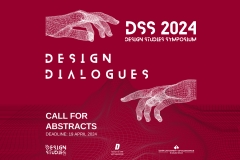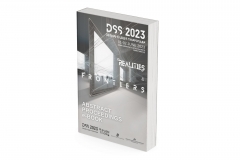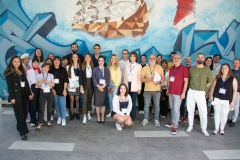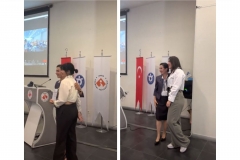
GRADUATE SCHOOL
Design Studies (With Thesis)
FFD 510 | Course Introduction and Application Information
| Course Name |
Individual Study
|
|
Code
|
Semester
|
Theory
(hour/week) |
Application/Lab
(hour/week) |
Local Credits
|
ECTS
|
|
FFD 510
|
Fall/Spring
|
3
|
0
|
3
|
7.5
|
| Prerequisites |
None
|
|||||
| Course Language |
English
|
|||||
| Course Type |
Elective
|
|||||
| Course Level |
Second Cycle
|
|||||
| Mode of Delivery | - | |||||
| Teaching Methods and Techniques of the Course | - | |||||
| Course Coordinator | - | |||||
| Course Lecturer(s) | - | |||||
| Assistant(s) | - | |||||
| Course Objectives | This first-year MA course is about process in writing and design making. The purpose is to introduce graduate students to design research methods and methodologies for the formulation and production of a thesis proposal, or a creative project that includes a written document. The aim of this thesis/project prep course is to provide students with consistent advising by the course coordinator on general issues (e.g., how to craft a research question, how to write a literature review, etc.), and by faculty members on specific inquiries related to the student’s topic in focus |
| Learning Outcomes |
The students who succeeded in this course;
|
| Course Description | The course allows students to explore an intellectual interest and produce an original piece of scholarly research or a creative project inclusive of a written work to describe the process and support its goals. The final outcome represents a commitment to research, critical thinking, and an informed viewpoint by the student. \\nThe course is arranged around a set of questions and methodologies, and develops from abstract to concrete ways in order to accommodate specific requirements for each student’s thesis/project. It consists of three phases: the first introduces key issues and concentrates on practical questions related to the ‘how’s’ (methodologies) in research making, academic reading and writing, and creative processes. The second part deals with developing theoretical and analytical skills for crafting a thesis/project research question, and the final phase involves an oral presentation and the production of the thesis proposal or creative project supported by a text. |
|
|
Core Courses | |
| Major Area Courses | ||
| Supportive Courses |
X
|
|
| Media and Management Skills Courses | ||
| Transferable Skill Courses |
WEEKLY SUBJECTS AND RELATED PREPARATION STUDIES
| Week | Subjects | Related Preparation |
| 1 | Introduction to the course What is an Individual Study? Basic terminology | No preparation |
| 2 | Choosing your topic/project and planning your research Finding and using sources Reference/Citation styles Thesis format | - Write a list of 3 tentative topics/project ideas with short description (100 words each) |
| 3 | Design Research Methods and Methodologies I Reading and writing critically | Bring 2 primary and 2 secondary sources relevant to your topic/idea |
| 4 | Design Research Methods and Methodologies II Gathering and organizing information Resources Identifying faculty advisors for student’s topics | - Write a list of 8 articles/papers/case studies relevant to the topic. Be ready to discuss at least 2 items of the sources - Assignment 1: Submit a mind map of your preferred topic/idea |
| 5 | Mid-term exam 1 Supervisions | - Study for the exam |
| 6 | Workshop or Field trip Exam analysis | - Assignment 2: Literature Review (1000 words) |
| 7 | Workshop or Field trip Literature review analysis | Assignment 3: Submit first thesis draft (2500 words) or project visuals and text (1000 words) with bibliography list (minimum 15 sources) |
| 8 | Theory: analysis I Supervisions | - Bring a list of 3 theoretical texts relevant to your work for discussion - Study the readings |
| 9 | Mid-term exam 2 | - Study for the exam |
| 10 | Theory: analysis II Exam analysis Supervisions | - Study the readings |
| 11 | Thesis/project drafts discussion | - Assignment 4: Submit thesis draft (4000 words) or project visuals and text (1500 words) with full bibliography list and appendix |
| 12 | Thesis/project drafts discussion | - Refine and format thesis/project |
| 13 | Powerpoint Presentations (section 1) | - Prepare Powerpoint and oral presentation |
| 14 | Powerpoint Presentations (section 2) | - Prepare Powerpoint and oral presentation |
| 15 | Final thesis/project submission | - Submit thesis proposal (5000 words) or project proposal with text (2000 words) |
| 16 | No Class | No preparation |
| Course Notes/Textbooks | Books, articles, theses, power point, presentations |
| Suggested Readings/Materials | TBA |
EVALUATION SYSTEM
| Semester Activities | Number | Weigthing |
| Participation |
15
|
20
|
| Laboratory / Application | ||
| Field Work | ||
| Quizzes / Studio Critiques | ||
| Portfolio | ||
| Homework / Assignments |
4
|
20
|
| Presentation / Jury |
1
|
10
|
| Project |
1
|
30
|
| Seminar / Workshop | ||
| Oral Exams | ||
| Midterm |
2
|
20
|
| Final Exam | ||
| Total |
| Weighting of Semester Activities on the Final Grade |
70
|
|
| Weighting of End-of-Semester Activities on the Final Grade |
30
|
|
| Total |
ECTS / WORKLOAD TABLE
| Semester Activities | Number | Duration (Hours) | Workload |
|---|---|---|---|
| Theoretical Course Hours (Including exam week: 16 x total hours) |
16
|
3
|
48
|
| Laboratory / Application Hours (Including exam week: '.16.' x total hours) |
16
|
0
|
|
| Study Hours Out of Class |
11
|
10
|
110
|
| Field Work |
0
|
||
| Quizzes / Studio Critiques |
0
|
||
| Portfolio |
0
|
||
| Homework / Assignments |
4
|
5
|
20
|
| Presentation / Jury |
1
|
10
|
10
|
| Project |
1
|
32
|
32
|
| Seminar / Workshop |
0
|
||
| Oral Exam |
0
|
||
| Midterms |
2
|
10
|
20
|
| Final Exam |
0
|
||
| Total |
240
|
COURSE LEARNING OUTCOMES AND PROGRAM QUALIFICATIONS RELATIONSHIP
|
#
|
Program Competencies/Outcomes |
* Contribution Level
|
||||
|
1
|
2
|
3
|
4
|
5
|
||
| 1 | to be able to expand the practical knowledge gained in undergraduate programs with theoretical field of design research, |
X | ||||
| 2 | to be able to examine, interpret data and assess concepts and ideas with research methods of design theory and social sciences, |
X | ||||
| 3 | to be able to identify problems of design disciplines in times of global / environmental crisis and to be able to develop possible solutions for design practitioners, |
X | ||||
| 4 | to be able to expand knowledge on the history of material culture as it relates to design practices of the past, |
X | ||||
| 5 | to be able to promote research on local practices of everyday life and assess the outcome to implement design solutions, |
X | ||||
| 6 | to be able to facilitate interactions in between varied design disciplines and to promote collaborative work to solve complex problems, |
X | ||||
| 7 | to be able to process outcome of design research to be applied in design education, |
X | ||||
| 8 | to be able to instigate research on the new tools, technologies and materials of production in order to accelerate changes in design practices, |
X | ||||
| 9 | to be able to develop an ethical approach towards design professions in order to install social and environmental responsibilities, |
X | ||||
| 10 | to be able to use a foreign language for both chasing the scientific publication and developing proper communication with colleagues from other countries, in written and verbal ways. |
X | ||||
| 11 | to be able to use computer programs needed in the field design as well as information and communication technologies in advanced levels (“European Computer Driving Licence”, Advanced Level”). |
X | ||||
*1 Lowest, 2 Low, 3 Average, 4 High, 5 Highest
NEWS |ALL NEWS

DSS 2024 CALL FOR PAPERS | THEME: DESIGN DIALOGUES
DSS 2024 CALL FOR PAPERS THEME: DESIGN DIALOGUES The Design Studies Graduate Program and the Faculty of Fine Arts and Design at the Izmir

Abstract Proceedings e-Book for the Design Studies Symposium 2023 is available now!
The Design Studies Symposium 2023 (DSS 2023), organized in collaboration with İzmir University of Economics Graduate School Design Studies Master's and PhD

Design Studies Symposium 2023: Realities & Frontiers
The Design Studies Symposium 2023 (DSS 2023) organized by the IEU Graduate School Design Studies programs was held on 1-2 June, at

The Best Paper Award at the Design Studies Symposium 2023: Realities & Frontiers
The voting for the best presentation award at the Design Studies Symposium 2023 (DSS 2023) organized by the IEU Graduate School Design




